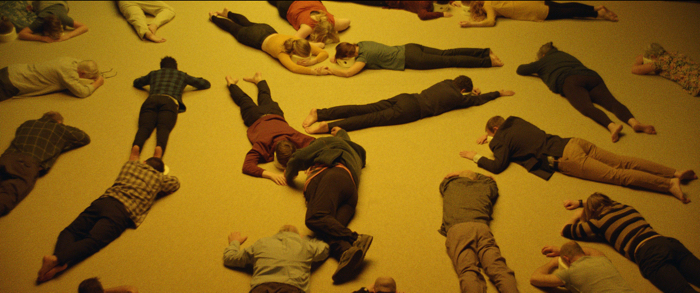
Dir.: Pella Kagerman, Hugo Lilja; Cast: Emilie Jonsson, Blanca Cruzeiro, Anneli Martini, Arvin Kananian; Sweden/Denmark 2019, 106 min.
This Swedish dread-fuelled sci-fi debut feels like Solaris directed by Ingmar Bergman.
Adapted from an epic poem by Swedish Nobel prize laureate Harry Martinson Aniara is both unsettling and beautiful to look at, embued with the melancholy of its original author who committed suicide after learning that he would have to share his Nobel Prize with his countryman Eyvind Johnson (both were members of the prize giving Swedish academy). Martinson had rather a dim view of humanity: a staunch progressive, his first wife left him “because he lacked political engagement” – hardly a reason for divorce, but something that was clearly vital for the success of their marriage.
Aniara is a slow burner in many ways: having watched it, one is satisfied, but not overwhelmed. But the film stays with you, the audacity and originality dawning slowly as you cast your mind back. A space transporter ferries wealthy Earthlings from our own now uninhabitable planet to a docking station somewhere in the firmament whence they will be transported to Mars. Alas, the three week journey is interrupted in the first few days when the Aniara, a sort of luxury mall, has to dump all its fuel to avoid a collision. The only chance of getting back on course is to locate a celestial body. Captain Chefone (Kananian) promises this for the near future but a wise, old astronomer (Martini) tells her roommate Mimaroben (Jonsson) that this will never happen. Mimaroben (or MR) is in charge of MIMA, a sentient computer system which allows humans to see viral images of the old Earth, by way of using the memories Earth-dwellers. After the astronomer is shot for “spreading panic”, MIMA shuts itself down, and MR and her lover Isagel (Cruzeiro), a pilot, are put in prison. They are released when the Ariana encounters a foreign body and Chefone hopes that the object will contain fuel. When this turns out to be wishful thinking, the space voyagers are filled with doom and gloom. Cults and anarchy reign, and Isagel becomes pregnant during a ritual. It falls to the two women to raise the child, and for a time, this nuclear family promises a sort of future.
Divided into chapters, Ariana is a slow descent into night. Visually this is a stunning endeavour and credit is due to DoP Sophie Winquist and PDs Linnea Pettersson and Maja-Stina Asberg. Instead of spending vast sums on interiors, the team make use of local malls, office blocks and amusement parks, Winquist always finding new angles to conjure up the passengers’ sheer terror at seeing their surroundings vanishing bit by bit. The ensemble acting is really convincing, with Martini’s cynical astronomer (“I was never impressed much by humans”) outstanding. There are no monsters populating Ariana – just talented humans beings. AS
ANIARA is released in Cinemas and on Digital HD from 30th August